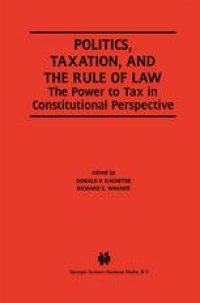
Ebook: Politics, Taxation, and the Rule of Law: The Power to Tax in Constitutional Perspective
- Tags: Political Science general, Business Taxation/Tax Law, Economic Policy, Public Finance & Economics
- Year: 2002
- Publisher: Springer US
- Edition: 1
- Language: English
- pdf
Public Interest Institute began operations in 1992 as Iowa's only state-level, independent, research organization. As a public-policy research organization, our four principal goals are to become an information and analysis resource for all Iowans; provide local, state, and national policy-makers with a rigorous, objective, and understandable analysis of specific policy initiatives; identify practical alternatives for action on critical issues; and provide a forum for policy-makers and individuals to share ideas and concerns. The Institute promotes the importance of a free-enterprise economic system and its relationship to a free and democratic society. It seeks to support the proper role of a limited government in a society based upon individual freedom and liberty. Concerned citizens are challenged to become better informed about public issues, for ideas have consequences, and involved individuals can make a difference. Following the general treatment of how to achieve these ideals contained in LIMITING LEVIATHAN, we have continued our series of books designed to examine the topics raised there in greater depth. In FEDERALIST GOVERNMENT IN PRINCIPLE AND PRACTICE we developed the ways in which dividing governmental power between levels such as national and state can help citizens preserve their freedoms. In this volume we develop the ways in which property rights do the same.
The essays in this book treat the relationships among politics, taxation, and the rule of law. A central tenet of democratic ideology is that taxation is something that we choose to do to ourselves, rather than being something that is imposed on us by some ruler. The basic ideology of the American constitutional founding is that government is not the source of our rights of person and property. To the contrary, government is something we establish with our prior rights of person and property to preserve and protect those rights. While it is possible to articulate some intellectual notions about good government and appropriate taxation, it does not follow from the mere fact of this articulation that actual taxation works as articulated. Taxation may be a necessary means of preserving and protecting rights of person and property, but it might also operate in various ways to undermine, abridge, and erode those rights. The central tenet of democratic ideology, a tenet that is reflected thoroughly in the American constitutional founding, is that it is people's prior right to their property that limits the reach of government. This ideology rejects without a second thought any notion that government defines the limits of people's right to property. Yet democratic practice may well contradict and subvert democratic ideology, though the relationship between practice and ideology is not so simple as one being dominant over the other.